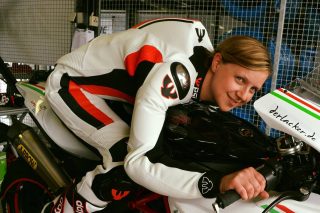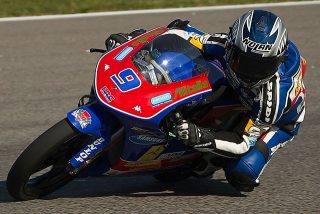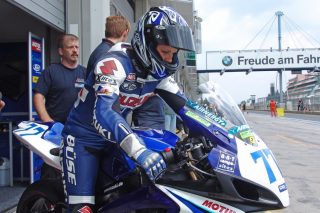
Several women stood out in motorcycle racing during the first two decades of 2000s and some of them even achieved the ultimate dream of every rider, which is racing in MotoGP. One of them is Marketa Janakova: the Czech raced in 125cc World Championship in 2003 and 2004, as a wildcard appearance in Brno was followed by ten races with Angaia Racing Team the year after. Marketa lived some more interesting experiences in the following years, before quitting racing in 2009.
Marketa Janakova told about her career, her life and some other topics in an exclusive interview and Palmen in Motorradsport is really honoured to share it with you all.
First of all, Marketa, how are you?
I‘m doing well. I have lived in Germany for more than 10 years and I’m working for one of the world-leading sports footwear brands. But I could never fully give up the motorcycle scene, so you will still find me on the racetrack, coaching other riders.
Great to know! Can you tell more about it?
I am still often riding a motorcycle, but I am no participating at any races myself. Since the end of my career, I am coaching hobby riders directly on the race track, so that they improve their riding skills. Some of them are ambitious and participate in championships. I am working with the agency Bike Promotion Europe, which is one of the biggest providers of the training for hobby riders and licensed races in Europe. I enjoy this job as a coach, because I can give my hard-earned experience to someone else. I have to be empathetic and find out in a short time where the limits of the rider are.
There were many challenges for me in the past years in this job. To teach someone what is the right ideal line in the corner, sitting position, braking process or anything else is easy, but when the rider comes to his limit or he/she is afraid after some crash, it is going to be a great challenge which I am very engaged to accept. It requires empathy, riding skills and experience to dissolve the block in the rider’s mind. Anyway, when I see their happy faces and the improvements in their laptimes, it is almost like winning a race.
Talking about your career, one of its highlights is when you raced in 125cc World Championship. Can you first tell about your “journey” until that and your first wildcard appearance in 2003?
It is already a long time ago, when I think about it. Until 2001 I was racing in Czech and European Championship with the pocket-bike. I rode against riders, who are very famous nowadays, like Dovizioso, Simoncelli, Pasini, Cortese, Lüthi etc. Like them, I made the next step to the 125cc class. First, in 2002, I participated in the Czech Championship. My second year in this championship became one of the most successful in my whole career. I became Czech Champion and I got the permission to start as a wildcard in Czech GP. It was an amazing weekend. Looking back to that, I have to say it was much more in the game than just my career leap.
The first challenge to start there was to get the permission from the Czech Federation, which I didn’t get even though I was the leading rider in my class. I have got it at the end from the FIM itself. The second was to get all the money to rent a competitive bike. I was very happy to cooperate then with Team Freudenberg, a German team that competed in IDM Championship (currently racing in IDM and World Supersport 300, ed). Thirdly, all eyes were on me, much more than on my other Czech colleagues, because I was a girl and it was still a rarity. Of course, I wanted to prove that who said that girls are not able to get there and compete were wrong.

In 2004 you contested ten races of 125cc World Championship. What are your best memories from that experience?
I started into the season with a huge crash and injury, as I suffered several fractures in my right hand and foot. That wasn’t the best condition to start competing in the World Championship. However, I have a lot of very nice memories from there. On the racetrack, indeed, it was a bit difficult. I experienced a lot of additional crashes with even more injuries, was also not allowed to start because of that in Donington Park. I had to find the courage to ride again without letting my injury heal, because the pressure was very high and it was the only shot I had got to ride in the World Championship. My team worked always very hard and supported me well. Anyway, we set up my motorcycle like Pedrosa did, despite the fact as a rider I had nothing in common with him. So today I would decide to speak up and start to set up my motorcycle differently. I also want to add that many young riders there, especially in the smaller teams, had to follow similar instructions as I did.
Your time in the MotoGP paddock was a bit short. Do you wish you had had the chance to stay longer?
Yes and no. I wish I was in my best physical condition and didn’t have that pressure like in 2004, when I had to show everyone that I was capable to compete. At the end of 2004 season, I was exhausted physically and psychologically. After 11 crashes in one season and a lot of fractures, I really began to think about the pain while I was riding, something that does not make anyone faster. Therefore I was going to lose the fun this sport gave me in the first place. I was lucky to overcome this point in my career by moving in the next class 600cc. All my pain and frustration vanished and I found the motivation and fun again.
The year after you moved to European Superstock 600.
Yes, and that season was a learning one. The step to 4-stroke motorcycles was not that common at my age, but my dad and I already knew it was going to be in my future. I could adapt very soon. At the beginning I was with an Italian team, but for financial reasons I didn’t finish the season with them. Anyway, on the racetrack, I had some very good time, very good results (including some top-20 finishes and a 6th place in Qualifying in Brno, ed) and I have learned a lot.
Where did you race from 2006 until 2009, when you retired?
At the end of 2005 I met Bert Poensgen, who was the boss of Suzuki Europe. His daughter, Katja Poensgen, raced in World Championship as well. I was racing for Suzuki Team since then. From 2006 till 2008 I participated in German IDM Supersport 600 Championship, Suzuki GSX-R 750 European Cup, Women’s European Championship and some races in Alpe Adria Cup. My last race was the EWC Speedweek in Oschersleben 2009. With my team, we won this race in our class. It was a valuable experience.

Do you keep following MotoGP and World Superbike?
I have to say that I am not really into some inside information and I am not spending a lot of time to get myself updated. What I cannot discard is to feel those emotions while I am watching the races on the TV. I also like to analyse the strategies, tech innovation and riding styles. I deeply respect everyone who gets there and fights, even at the end of the grid.
What is your opinion about the current situation of women in motorcycling? How would you further boost their involvement in this sport?
We are talking about a sport art for individual athletes, that means you have to fight on the race track for yourself. It does not matter whether you are a man or a woman, until you proof how fast you are and how hard you can fight back. Once you do, you have to prove it continuously. Of course, nowadays the scepticism has decreased because there are pretty good proofs. Thanks to the success of some girls in motorsport like Maria Herrera, Kiara Fontanesi, Shayna Texter, Lucy Glöckner and first of all Ana Carrasco, there are no doubts that girls can do it.
In my opinion, no matter who, we all are riders when we put the helmet on. If you want to win the race, you need passion, determination, talent and other such things. If you do not have it, no chance. Unfortunately, this is still not enough, because in the first place this sport is driven by money. So I hope there will be always small projects that allow young talented riders to start and grow with small money, to prove whether they are able or not. This never should become a sport for only rich people. That is how I would support this sport and that would also help to increase automatically the involvement of women.
In conclusion, are you happy with your racing career in general? Is there anyone you are grateful to for what you’ve lived?
I am very happy about and proud of my career. I am thinking a lot about old times, and I am happy to draw from this experience. I wouldn’t have even thought about starting to do this sport, if my father would not have had the wish that his son will become a racer. Just for the record, finally my father became two daughters. Until today, it is a mystery to me how he could manage this and bring me to the World Championship. He died in 2007, which was probably one of the main reasons why I started to think about retirement. Of course, I owe a big thank you to him and my whole family.
Palmen in Motorradsport says “thank you” to Marketa for her kindness and wishes her all the best.